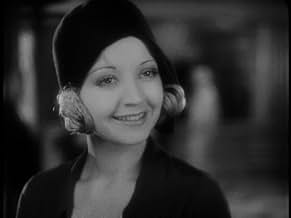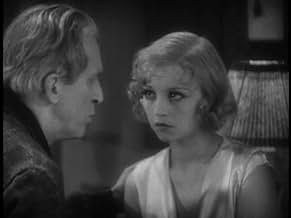Sheba has a dull boyfriend and seems destined for a dull marriage when she meets a rich playboy who has money to burn and places to go. She gets involved with the playboy and never seems to ... Read allSheba has a dull boyfriend and seems destined for a dull marriage when she meets a rich playboy who has money to burn and places to go. She gets involved with the playboy and never seems to notice that he might be shady and untrustworthy.Sheba has a dull boyfriend and seems destined for a dull marriage when she meets a rich playboy who has money to burn and places to go. She gets involved with the playboy and never seems to notice that he might be shady and untrustworthy.
- Undetermined Role
- (uncredited)
- Police Sgt. Mulligan
- (uncredited)
- Bus Passenger at Window
- (uncredited)
- Railroad Ticket-Seller
- (uncredited)
- Pirate's Den Waiter
- (uncredited)
- Detective
- (uncredited)
- Nightclub Patrol
- (uncredited)
- Specialty Dancer
- (uncredited)
Featured reviews
Like many pictures made in 1929, it looks like a silent film; its exaggerated movements and facial expressions are pure silent cinema. But this has got sound, lots of sound and apart from the stilted vocal delivery (due to poor equipment, not poor acting) it's used to great effect in enhancing the mood and feel of a time even before the Depression. Although this is horribly handicapped by being made using Warner's unwieldy Vitaphone system - which was obsolete as soon as it was invented, Mervyn LeRoy works wonders with the hand he's been dealt. These very early Vitaphone pictures were hampered by the sound recording to often be confined to a static studio set but visually this one is quite impressive with some great cinematography. In terms of storytelling, LeRoy pulls a rabbit out of the bag by making it compelling and honestly quite exciting. It is better than you'd expect because of its decent story and decent director. If you compare his innovative style with that of Edward Cline who made the atrocious SWEET MAMA, again with the lovely Alice White a few months after this, you will understand why Mervyn LeRoy is still remembered today.
The story, which is by Vina Delmar is simple but engrossing - somehow completely unrealistic yet also believable. What's it about: blonde bimbo ditches her dull, dumb idiot boyfriend for a slick, smooth creep whom to everyone but her, is obviously some sort of minor gangster. It's a cracking little plot and I honestly did not see the plot twist coming - I was genuinely surprised! The dialogue is silly but it isn't meant to be taken that seriously, it's delivered straight but it's all very tongue in cheek and works keeping everything light-hearted but still conveying the daft but enjoyable story.
Most people will watch this because of Alice White, lovely Alice White! She might have been a pretty awful actress but she's so adorable that you instantly forgive her lack of talent. Like Marilyn Monroe did twenty years later, she invented a character and became that role: Alice White was created by Alice White because that's what the movies wanted at that point in time. She had never even planned to become an actress; she was a slightly chubby, dark-haired script girl working for Charlie Chaplin with a nick name of Peter Rabbit then one day a cameraman suggested she put on a blonde wig and 'pout like a movie star' to test his equipment. From that moment, Alva White became Alice White. In this picture she really plays up to that dizzy blonde caricature of herself. Obviously she would never win any Oscars but in this one she does put some effort into proper acting and it's considered to be one of her best films.
Inexplicably Alice While isn't to everyone's taste but if she is, this is a must for you. Some of you may find her wide-eyed cuteness and sweet little girl voice unbearable but if you do you clearly are a loathsome spotted reptile with no soul.
White is adorable and gets to sing "You Learn About Love Every Day." It's her only song but the nightclub acts sing a few more, including "You're My Captain Kidd" and "That's the Lowdown on the Lowdown." By 1930 audiences were tired of backstage musicals so filmmakers moved the numbers out front, which made them more realistic.
Morris and Bakewell are good, and then there's Marion Byron as the jazzy phone operator in the office where White works. White and Byron had also starred together in Broadway BABIES. Maurice Black is good as Joe the Bartender who gets suckered by Morris. Richard Carlyle plays White's father. And in a humorous tenement bit, Nellie Nichols and Ann Brody play a pair of immigrant gossipers who hang out their windows and exchange news in fractured English.
PLAYING AROUND was one of five films White starred in in 1930. In 1931, she had her final starring role in THE NAUGHTY FLIRT.
Worth a look for Alice White and some snappy pre-Code dialog.
What can I say, this is a creaky old morality tale, but I'm a sucker for Alice White and that fact bumped up my review score. She plays a daddy's girl who's dating a stable guy (William Bakewell) she thinks is boring, as evidenced by him eyeing the expensive drinks menu at a nightclub and deciding the buttermilk is about all he can spring for. Despite taking place during the Prohibition era, beer is included in a list of non-alcoholic drinks and one gets the idea there are lot more on offer, but regardless, at $0.40 for the milk and with a cover charge of $1.50 a guest in 1930, which would come to $66 in 2025, he has a point. After she goes onstage on a whim to appear in a "pageant of the knees", where behind a curtain down to knee-level she and other young women strut around so that their legs can be judged (ooh la la), a playboy (Chester Morris) with a fancy car takes an interest in her. The trouble is, despite all his smooth talking, he's a phony, owing money all over town. She's of course smitten with him and his big, er, car, cooing "There's an automobile horn that's really got sex appeal."
It's obvious where this is going to go from there, but it was mildly surprising in how it got there, albeit contrived and poorly scripted. To be honest, it's kind of hard to really like the "good guy" as he's kind of a sap, and also because he quips "It's all right honey, women can't be expected to judge human nature like us men" when delivering the film's final judgment. There are other little bits that make up for that though, including Alice White singing "You Learn About Love Every Day" (obviously playing into the moral of the story), the agile Doris McMahon contorting herself in that early stage show, and Marion Byron as the savvy fast-talking co-worker. I also absolutely loved seeing Carolynne Snowden and her leggy dancing ensemble perform "That's the Lowdown on the Lowdown" near the end of the film. It's the women in this film that made it mildly enjoyable, despite its old-fashioned script.
Although director Mervyn Leroy keeps things moving at a slightly stodgy pace in the dialogue, and Miss White seems to be a nitwit, there are some nice points to this movie. For one, there are a few songs by Sam Stept and Bud Green -- and no, I don't think I've heard of them before either. Miss White sings "You Learn About Love Every Day", and it's a good song, with the tune reprised a couple of times. Another song, "That's The Lowdown on the Lowdown" is an okay piece, but it's given a fine performance by Carolynne Snowden. In addition, there's a fine moving shot with talking going on. Since this was finished and copyrighted in 1929, someone should have told the sound engineer Earl Sitar you couldn't do that, not in Hollywood. He was suitably punished by being uncredited, and being stuck in the B movies.
Although there's a lot to kvetch about here, the things that it does right outweigh those easily, particularly Morris' performance, clearly meant for a star build-up. With Richard Carlyle, Marion Byron, and George "Gabby" Hayes with his teeth in.
Did you know
- TriviaIn September 1928 Warner Bros. Pictures purchased a majority interest in First National Pictures and from that point on, all "First National" productions were actually made under Warner Bros. control, even though the two companies continued to retain separate identities until the mid-1930s, after which time "A Warner Bros.-First National Picture" was often used.
- Quotes
Jack: Gee, you look sweet, Sheba. Yuh gotta date?
Sheba Miller: Yes. I'm gonna see Al Jolson.
Jack: Yuh haven't got a date with *him*, have you?
Sheba Miller: Don't be an eggnog - I'm going to the movies with Maude.
- Crazy creditsAfter the end title, there is a series of clips, accompanied by a reprise of "You Learn About Love Every Day." Needless to say, this was extremely unusual in that era.
- Alternate versionsThis movie was also released as a silent film, but no details are known.
- SoundtracksYou're My Captain Kidd
(1929) (uncredited)
Written by Sam H. Stept and Bud Green
Performed by Carolynne Snowden and chorus at the nightclub
Details
- Release date
- Country of origin
- Language
- Also known as
- Piernas triunfadoras
- Filming locations
- Production company
- See more company credits at IMDbPro
- Runtime
- 1h 6m(66 min)
- Color







































